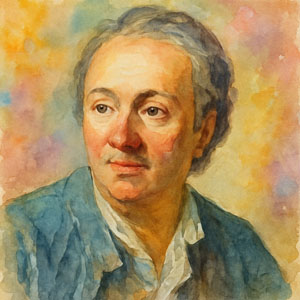 Born in Langres, France in 1713, Denis Diderot (1713–1784) was a philosopher and novelist whose passions fueled the Enlightenment.
Born in Langres, France in 1713, Denis Diderot (1713–1784) was a philosopher and novelist whose passions fueled the Enlightenment.
He thirsted for knowledge, questioned life and the universe, and believed that faith should be tested by reason. In Pensées philosophiques (1746), he argued that passions were necessary to creativity and morality—bold ideas that brought both acclaim and condemnation.
Diderot returned again and again to his convictions: “Our real opinions are those to which we return most often.” Even when imprisoned at Vincennes for his writings, his spirit remained unbroken.
An advocate for change in literature and theater, he sought balance between reason and emotion. Using dialogues to pose questions without fixed answers, he asked, “But who shall be the master, the writer or the reader?”
For Diderot, passion was the spark of philosophy, the fire of creativity, and the bridge to happiness. Through his courage and curiosity, he showed that philosophy could ignite not just the mind, but the heart.
 Live passionately! ❤️🔥
Live passionately! ❤️🔥
